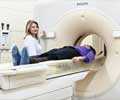The US Food and Drug Administration has issued a nationwide alert to hospitals urging review of their safety protocols for CT scans.
The US Food and Drug Administration has issued a nationwide alert to hospitals urging review of their safety protocols for CT scans.
The alert follows reports that patients at Cedars-Sinai Medical Center, Los Angeles were exposed to high doses of radiation from CT brain scans used to diagnose strokes.Over an 18-month period, 206 patients received radiation doses that were approximately eight times the expected level. Instead of receiving the expected dose of 0.5 Gy (maximum) to the head, these patients received 3-4 Gy. In some cases, this excessive dose resulted in hair loss and erythema, the agency said in its alert.
About 40% of the patients at the Cedars centre lost patches of hair as a result of the overdoses, a hospital spokesman said.
While this event involved a single kind of diagnostic test at one facility, the magnitude of these overdoses and their impact on the affected patients were significant, the FDA said.
This situation may reflect more widespread problems with CT quality assurance programs and may not be isolated to this particular facility or this imaging procedure (CT brain perfusion). If patient doses are higher than the expected level, but not high enough to produce obvious signs of radiation injury, the problem may go undetected and unreported, putting patients at increased risk for long-term radiation effects.
Patients should follow their doctor’s recommendations for receiving CT scans. While unnecessary radiation exposure should be avoided, a medically-needed CT scan has benefits that outweigh the radiation risks, FDA counselled.
Every facility performing CT imaging must review its CT protocols and be aware of the dose indices normally displayed on the control panel.
It is working with the parties involved to gather more data about this situation and to understand its potential public health impact.
Meantime, FDA said, it requires hospitals and other user facilities to report deaths and serious injuries associated with the use of medical devices. If you suspect reportable adverse events associated with CT devices, you should follow the reporting procedure established by your facility. Prompt reporting of adverse events can improve FDA's understanding of and ability to communicate the risks associated with devices and assist in the identification of potential future problems associated with medical devices, the alert added.
Source-Medindia
GPL
 MEDINDIA
MEDINDIA



 Email
Email




